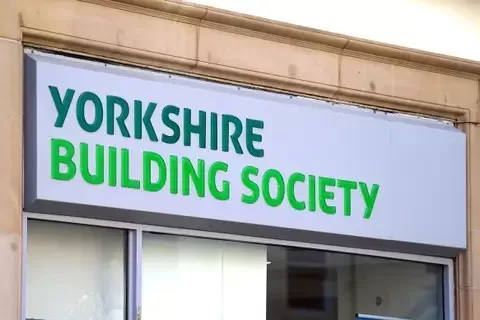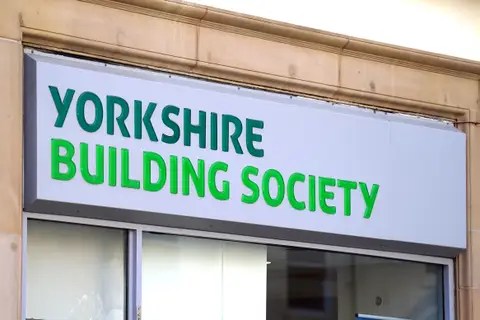The Yorkshire Building Society deal will enable budding homeowners to get on the property ladder with a £5,000 deposit.
For someone buying a typical first-time buyer property at £200,000, a £5,000 deposit would equate to 2.5% of the purchase price.
This means that the remaining 97.5% would need to be borrowed as a mortgage.
The new deal offered by the Yorkshire Building Society will enable buyers across England, Scotland or Wales, to purchase a property valued up to £500,000 with a deposit of just £5,000.
The new mortgage is available directly to customers and via brokers through Accord Mortgages – the lenders’ intermediary-only arm.
The Yorkshire’s director of mortgages, Ben Merrit, said research by the society indicated that £5,000 is the amount that could shorten the time needed for first-time buyers to get mortgage-ready.
He added that it could help encourage a “level playing field for those who don’t have financial support from their families to fall back on.”
The deal is available to first-time buyers only and means that borrowers with a deposit of at least £5,000 could take out a five-year fixed-rate mortgage at 5.99%.
In comparison, the average five-year fix stood at 5.34% last week, according to Moneyfacts.
The mortgage is not available for new-build properties or flats and the loans are subject to rigorous credit scoring and affordability checks.
The maximum borrower age at the end of the mortgage term is 70.
Previous research by the building society indicated that around two in five (38%) first-time buyers receive financial help from friends and family to get onto the housing ladder.
Rachel Springall, a finance expert at Moneyfactscompare.co.uk, said: “This new deal from Yorkshire Building Society will no doubt be popular among aspiring buyers.
“Anyone who borrows at a higher loan-to-value would be wise to overpay their mortgage whenever they can to gain more equity and aim to reach a lower loan-to-value bracket where cheaper deals could be found when they come to refinance.”
The money expert also added that borrowers should speak to their lender and seek advice immediately if there are any concerns about falling into negative equity with a high loan-to-value deal.
What is negative equity?
Negative equity is when you owe more money on your mortgage than the value of the property.
This is a position that you don’t want to find yourself in because as well as leaving you out of pocket, it could make it difficult to sell or remortgage.
If you have a low deposit mortgage and house prices fall, it could result in you being unable to sell or get a new loan.
This means homeowners could get stuck on expensive mortgages once their fixed-rate deal expires.
What to do if you’re in negative equity
Below are some tips on what you can do if you find yourself in negative equity.
If you’re looking to sell: You may find it difficult to move if you’re in negative equity, but it’s worth speaking to your lender and asking what help it can give you.
How easy it’ll be to move will depend on several factors, including how much negative equity you have, the value of your new property and if you’re up-to-date with your existing mortgage.
If you’re about to remortgage: If your fixed deal is coming to an end, you may also find it harder to remortgage but even then it’s worth speaking to your lender.
It may offer you an alternative fix to switch onto rather than having to accept a standard variable rate, which should protect you against future interest rate rises.
Get a “negative equity mortgage”: Some lenders, offer mortgages that let you transfer the negative equity to a new property.
The eligibility criteria can be strict though, and the interest rates are generally higher.
Reduce your negative equity: If possible, you should try and reduce your negative equity by overpaying on your mortgage.
Just make sure to double-check whether your existing mortgage will let you make overpayments and, if so, how much you can overpay without being hit with early repayment charges.
What are other lenders offering?
Yorkshire Building Society is not the only lender offering help to would-be homeowners struggling to save a deposit.
Skipton Building Society offers a “track record” mortgage, which helps renters make the jump onto the property ladder, potentially with no deposit needed, subject to terms and conditions.
Skipton uses borrowers’ records of rental payments to help work out what they may be able to borrow.
Some lenders also offer deals where family members put up savings as security for a certain time period – such as Barclays’ family springboard mortgage.
In May last year, it was announced that aspiring homeowners could have their subscriptions to services such as Netflix or Spotify contribute to their ability to get a mortgage, following a new partnership between Leeds Building Society and credit information company Experian.
Leeds Building Society connected to the Experian Boost service, which allows extra evidence of a borrower’s good financial track record to be factored into lending decisions.
What other first-time buyer schemes are available?
The First Homes scheme was launched in 2021 and means prospective first-time buyers in England can get homes at 30% and 50% discounted rates compared to market price.
But if the homeowner decides to sell the property down the line, the discount on the new value will be made available to any future buyer too.
As well as being first-time buyers, you also have to be aged 18 or above to qualify.
Each council has its own criteria for the scheme so make sure that you check with your local one.
If you don’t know who your local council is, you can find it using this handy tool.
Another option is the Right to Buy scheme which is a government initiative that lets council house tenants buy the property the rent.
These homes are offered at a reduced price to help renters get on the ladder.
You get a 35% discount on your council home if you’ve been a public sector tenant for between three to five years.
After five years, the discount increases by 1% for each extra year you’ve been a public sector tenant.
There are also other schemes such as Right to Acquire which works in a similar way to Right to Buy, and Shared Ownership which is also known as part-buy, part-rent.
To get more information about these schemes and five other ways you can get discounts on your home, we spoke to mortgage expert David Hollingworth.
Who is eligible for the First Home Scheme?
ONLY first-time buyers can purchase a home under the First Home scheme and it’s not available in Wales or Scotland.
As the scheme is aimed at helping buyers on lower incomes get on the property ladder, you won’t be eligible if your combined household income is over £80,000, or £90,000 if you live in London.
Those who can afford to buy one of the homes without a mortgage will not qualify for the help.
Buyers must use a mortgage for at least 50% of the price of the discounted home.
However, further conditions can be set by local councils so the eligibility criteria may vary depending on where you’re looking to buy.
For example, some authorities may give key workers first dibs.
But after the first three months of the homes going on sale, extra conditions set by the local authority will be removed for any First Homes which haven’t been sold or reserved.
Do you have a money problem that needs sorting? Get in touch by emailing [email protected].
Plus, you can join our Sun Money Chats and Tips Facebook group to share your tips and stories.

